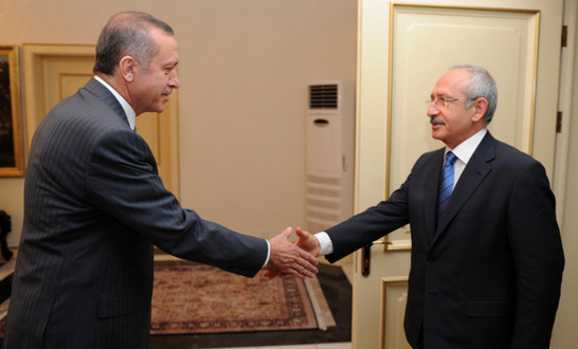The relationship between Turkey and Israel is currently entering a new season, the raison d’état of which is business. After breaking diplomatic relations following the Israeli military offensive against the Turkish boat Mavi Marmara in 2010 – a bloody attack against the activists of the Gaza-bound Freedom Flotilla that resulted in the death of nine Turkish citizens – late last month the Turkish media announced the signing of an agreement for the sale of military aircraft electronic system by Tel Aviv to the Ankara government.

Erdogan (left) and Syria’s Bashar al-Assad in better days (Photo: todayszaman.com)
The new system will complete the aircraft system already developed by the Turkish military industry, the so-called AWACS (Airborne Warning and Control System). AWACS is a radar system designed to intercept airplanes, boats and vehicles over long distances and to manage air battles against possible enemies. The agreement, over one hundred million dollars, dates back to 2002 and includes the sale of four Boeing 737 with radar control and an electronic defense system.
This contract was never implemented, however, because of the Israeli refusal to provide the last two parts necessary to complete the AWACS system. This refusal followed the Turkish decision to freeze all the diplomatic relations with Israel and to proceed with trials in absentia against the Israeli soldiers and officials charged with the deaths of the nine activists.
At the time of the attack of the Israeli special forces against the Mavi Marmara, Turkish premier Erdogan asked Israel for an official apology and financial compensation for the families of the nine victims. Those were the Turkish conditions for resumption of bilateral relations, but Israel refused to meet these demands. In the final report of the Turkel Commission, an Israeli government committee of inquiry to investigate the Mavi Marmara “incident”, “experts” completely absolved the government of any guilt and labeled Israel’s use of force against unarmed activists “as appropriated and proportionate to the threat”.
It took the direct intervention of the American company Boeing to push the stalled sale agreement forward. According to an official of the Turkish Defense Ministry, “Boeing told Israel that its refusal to complete the delivery was damaging their own business”.
Thus, Israel decided to end its two years of “embargo” against Turkey: since 2010, the Netanyahu government had banned exports to Ankara. However, this relationship was restarted as business is business: not only in the military field, but also in that of energy.
On the table there is also an agreement for a joint Turkish-Israeli project to construct a pipeline from Israel via Turkey for the export of natural gas to Europe. In this case, it’s the Turkish government that is slowing down project implementation. Just two weeks ago the Turkish Minster of Energy, Taner Yildiz, said that Ankara would not give the green light for the project until final approval of Erdogan.
The Israeli offer includes the construction of a pipeline that starts from the Leviathan basin – the richest one in Israel – and continues along the southern coast of Turkey in order to meet the energy needs of European countries for a total of 425 billion cubic meters of gas.
The Israeli hurry is understandable, but Turkey brakes: first of all, Tel Aviv must meet the political conditions of Erdogan. The Turkish premier, in words, has always shown himself as a strenuous opponent of the Jewish state: several time the prime minister called the Israeli state a “terrorist state”.
But don’t forget another element, essential to understand the current relations between the two countries: the intention of Ankara to assume the role of leader of the Arab world, taking advantage of an Egypt still too unstable and a Syria engrossed in civil war. Erdogan doesn’t hide his desire to make Turkey the new regional power, breaking relations with his former ally Bashar al-Assad and highlighting Iran as the common enemy.
In such a context, Israel needs to get closer to Turkey, given the relations (similar to a cold war) with Damascus and Teheran. Turkey could become for Israel what Egypt was for decades: under Mubarak’s dictatorship, Israel enjoyed the support of Cairo, a guarantee of great value inside the Arab world.
But what makes Turkey close to the Jewish state? According to Palestinian writer and political analyst Nassar Ibrahim: “In order to understand the current game of alliances, we need to start from the history: for decades Turkey and Israel have maintained good political and military relations. The attack against Mavi Marmara is the exception, not the rule. The Turkish prime minister took this opportunity to show himself as the only Arab leader able to face Israel and to defend the right of the Palestinian people. In those months, there were lots of Turkish flags raised during demonstrations in West Bank and other Arab countries. Erdogan’s success, however, didn’t come from his political stature, but from frustration over the silence of the other Arab regimes”.
Until the outbreak of the Arab Spring. “Erdogan, as leader of a party belonging to the Muslim Brotherhood, understood that it was the time for Turkey,” notes Ibrahim. “Ankara could make a difference and become the new leader in a Middle East led by the Muslim Brotherhood. Because of this idea, Erdogan immediately pushed Turkey against the regimes of Mubarak, Ben Alì and Ghaddafi. And at the end, against Bashar al Assad, making a strategic mistake of great importance: Syria was a close ally of Turkey for decades. The two countries had excellent political, economic and military relations until Erdogan’s decision to abandon the old friend Assad, in the belief that the Syrian president would soon fall and leave space to a new government, led – like in Tunisia and in Egypt – by the Muslim Brotherhood”.
Yet two years after the beginning of the Syrian civil war, Damascus hasn’t fall down and – while the traditional Islamic opposition groups (including the Muslim Brotherhood) are losing ground – Al Qaeda militias advance. “Erdogan is in crisis, his strategy is also in crisis because of internal unrest. The Turkish people is traditionally and historically close to the Syrian one and no one there understands the need to abandon Damascus. In particular the army, a strong and rooted power in Turkey, is harshly criticizing Erdogan: to promote his party’s interests (to become the point of reference of all the Muslim Brotherhood parties), he sacrificed the political and economic interests of Turkey”.
“It is in this context that we must read the new rapprochement with Israel,” Ibrahim explains. “Turkey is isolated, it is now surrounded by antagonistic states: Syria, Iraq, Iran. Erdogan now has only NATO, Europe and United States, the closest allies of Israel. If Ankara wants western support and the Patriot missiles, it needs to renew its relationship with Tel Aviv”.





